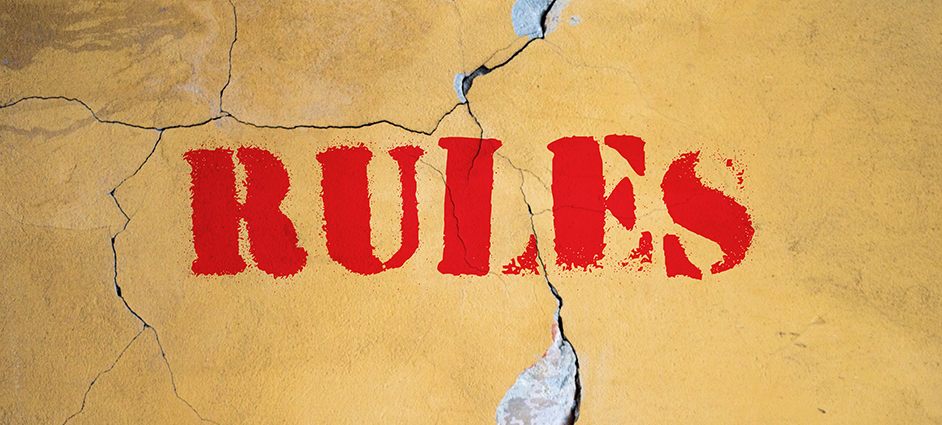SIEF2021 15th Congress
Helsinki, Finland
19-24 June 2021
Breaking the rules? Power, participation, transgression
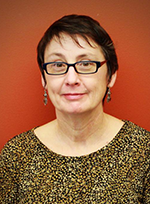
Kathrine Borland
Slow Activism: Lessons from Citizen Scientists
Kathrine Borland (Ohio State University)
Chair: Lotte Tarkka
Assistant moderator: Eerika Koskinen-Koivisto
Short abstract: What lessons might folklorists learn about engaging people across ideological difference from citizen scientists? Drawing on work from a five-year collaborative ethnography project located in Southeastern Ohio, I explore the concepts of slow activism and thinking like a watershed.
Long abstract and biography +
Long abstract
In the United States, the rural Midwest is often dubbed the flyover zone, dull and
uninteresting compared to our coastal centers of culture. More recently, this area has acquired its
own veneer of danger, a lawless place of right wing militias, intolerance and guns. Only by visiting
do we urbanites begin to understand rural people as diverse in their backgrounds and views and
steeped in their own natural and cultural histories.
In Southern Ohio this history includes an incredible story of forest return, initiated by prescient state and federal politicians in the early twentieth-century, but abetted by countless private smallholders, and more recently, by nonprofit organizations and voluntary associations committed to a greener future. Reversing standard practice, I suggest we look for theory not in the urban centers of academic learning but in the slow activism of rural citizen scientists who are working to transform area residents into stewards of their own forests and watersheds.
What lessons might ethnographers learn about engaging people across ideological difference for a common good from those who have been working on behalf of nature for the last quarter century? Taking up Maribel Alvarez's recent call to imagine ourselves as Citizen-Folklorists (Alvarez and Nabhan 2018), I ponder the role of the folklorist in documenting groups who are already adept at telling and sharing their own stories. What does solidarity and allyship look like in this case? And finally, where is the space for critique? In keeping with the rule-breaking impulse of the conference, and considering the limitations and affordances of the zoom platform, I will construct my presentation in the form of an illustrated, subtitled podcast.
Biography
Kathrine Borland is the Director and Graduate Studies Advisor at the Ohio State
University, Center for Folklore Studies, and Associate Professor in the Department of Comparative
Studies. She studies and teaches about the artfulness of ordinary life, and the ways in which
traditional expressive arenas constitute contested terrain. In 2013, she published International
Volunteer Tourism: Critical Reflections on Good Works in Central America (co-edited with
Abigail E. Adams, Palgrave). Subsequently, she has published a number of essays on a range of
subjects in narrative research, service-learning models, diverse environmentalism, and interrogating
race in folklore and in the folklore classroom.
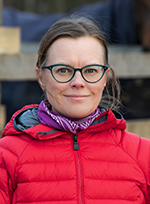
Sanna Valkonen
The multiple worlds of Sámi research
Sanna Valkonen (University of Lapland)
Chair: Coppélie Cocq
Assistant moderator: Pirjo Kristiina Virtanen
In my presentation I will address the ways collaboration between academic research and art can at its best contribute to transgressing academic conventions and mindsets and reveal (dis)ruptures in our established research practices and thinking.
Long abstract and biography +
Long abstract
The presentation is based on the experiences of collaborative projects related to re-interpreting
and -articulating Sámi intellectual and societal traditions:
1) Viidon Sieiddit – the New Dimensions of the Sámi Nature Relations, an experimental project combining artistic work and research examining and imagining particular ways of the Sámi to know, be related to and care about environments of the globe in the era of environmental concern;
2) The Ontological Politics of Sámi Cultural Heritage, parallel projects aiming at studying the multiple worlds of Sámi cultural heritage in Sámi society by means of rap, visual arts and multidisciplinary arts in addition to more conventional ways of making research. What are the rules that are leading our ways of perceiving and producing academic research and knowledge? How can they be transgressed by collaboration between art and science?
Biography
Sanna Valkonen is a Sámi scholar and Professor of Sámi Research at the University of
Lapland. Her research fields include the politics of indigeneity and belonging, cultural heritage,
gender and religion, and related power relations in the Sámi context. Central to her current work is
developing Sámi research concepts and artistic research
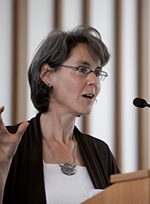
Ellen Hertz
Rules: pros and cons.
Ellen Hertz
Chair: Laura Stark
Short abstract: Rules are a basic property of human societies and yet they occupy a historically contested place in the modern narrative about what makes us human. Reframing rules as potentialities helps break this spell. It allows us to ask not what should we do but what can we do, and to take the measure of the limits of our actions, as humans and as social scientists.
Long abstract and biography +
Long abstract
In French-speaking Switzerland, we have an aphorism: “I’m neither for it, nor against it, quite
to the contrary” (“ni pour, ni contre, bien au contraire”). This is my initial reaction to the
questions raised by SIEF’s 15th Congress “Breaking the Rules?”. Answering these questions
may be the most important thing the social and cultural sciences can do in the 21st century.
Yet, framing the contemporary moment in terms of rules is also a trap, for it reinforces the
anthropocentric vision of reality that has brought us to the catastrophic situation we are
now living: irreversible environmental destruction, massive inequality and the decline of
democracy.
Rules are infinitely malleable and ambivalent, at the same time a reflection of power inequities, a mechanism for reinforcing these inequities and a means to challenge them. Transgressing them can both create new spaces of freedom and reinforce the norms that they seek to establish. Rules are a basic property of human societies and yet they occupy a historically contested place in the modern narrative about what makes us human. Reframing rules as potentialities helps break this spell. It allows us to ask not what should we do but what can we do, and to take the measure of the limits of our actions, as humans and as social scientists.
Biography
Ellen Hertz is professor of anthropology at the University of
Neuchâtel. Her background in Chinese studies, law and anthropology has translated into a
long-standing interest in the complex and ambiguous mechanisms of bureaucratization and
marketization that characterize contemporary modernity, and on the place of gender in these
configurations. She has published on diverse topics (financial markets; international organizations;
intangible cultural heritage; sex work; corporate social responsibility and environmental
anthropology) and maintains an active interest in theoretical developments in the social sciences,
with an emphasis on gender, citizenship and normative regimes.
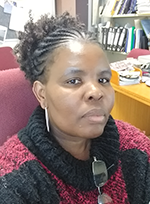
Susan Keitumetse
Exploring environment-community connections in Africa’s nature reserves: Overlaying community
cultural values to enhance conservation
Susan Keitumetse (University of Botswana)
Chair: Suzie Thomas
Assistant moderator: Pia Olsson
Short abstract
At national level in Botswana, certain communities have had to make way for national ad international
resources conservation developments in various geographical areas and landscapes of the country.
Examples of these are during the establishment of national parks, game reserves, world heritage sites
amongst others. At international level approaches such world heritage site designation have before
called for designation of what is termed “core zones” in most African sites.
Long abstract and biography +
Long abstract
At national level in Botswana, certain communities have had to make way for national ad
international resources conservation developments in various geographical areas and landscapes of
the country. Examples of these are during the establishment of national parks, game reserves, world
heritage sites amongst others. At international level approaches such world heritage site
designation have before called for designation of what is termed “core zones” in most African sites.
This has also seen local communities relocate and reside distances away from their traditional
landscapes of cultural value. However, when these communities relocate they leave behind imprints of
their past relationships with the landscape. They carry with them memories of the socio-cultural
identity with these landscapes, as well as the overall cultural heritage of their society. The
sustainable development goals emphasize generations to generations transmission of resources and
ideas, hence cultural heritage is commonly conflated with people’s survival imprint, enough to be
used to build a bridge between these conservation models and people’s disconnection with heritages
in the landscapes that we have now zoned off for nature conservation. I have proposed before in my
long line of research that Africa’s host of most endangered sites in UNESCO world heritage list, and
the threat of poaching in the now ‘nature’ spaces could be curbed by bringing in the local
communities’ relationship with their landscapes in a cultural coded manner. In this presentation I
discuss how we need to break the rules of protecting areas from its people as this dislocates the
relationship that could enhance our conservation models as cultural heritage practitioners. I
propose that new approaches to management of African protected areas encompass the cultural aspects
of these landscapes as a way to resuscitate communities’ relationships with their landscapes, in the
process allowing for committed guardians to these landscapes as their sense of belonging can be
evoked in this way, as opposed to being nullified by the application of non-compromising closed off
protected nature area models. I use Botswana’s well preserved national parks and game reserves as
case studies. I also use the UNESCO Conventions on World Heritage (1972) and on Safeguarding of
Intangible Cultural Heritage (2003) as case studies for this discussion.
Biography
Susan O. Keitumetse (PhD, Cambridge) is UNESCO Chair holder (African Heritage Studies and
Sustainable Development) and a research scholar (Cultural Heritage and Tourism) at the University of
Botswana.
She is the author of a book volume titled “African cultural heritage conservation and management: Theory and Practice from Southern Africa” (2016) published by Springer – refer publisher website for book details. She is also a lead editor of a published book volume titled: Sustainability in Developing countries: Case studies from Botswana’s journey towards Sustainable Development (2020) by Springer – refer publisher website for book details. In addition to the two internationally published books, Dr Keitumetse has published journals in international journals and book chapters in numerous international publisher books. Dr Susan O. Keitumetse’s work on heritage conservation and management is well documented in her numerous international, national outputs illustrated in several online scholarly profiles – refer Dr Keitumetse google scholar profile.
Dr Susan O. Keitumetse’s work on heritage conservation and management is well documented in her numerous international, national outputs illustrated in several online scholarly profiles – refer Dr Keitumetse google scholar profile.
Her current research work is on projects that the relevance of cultural heritage in enhancing environmental conservation of African landscapes in a way that will lead to the achievement of sustainable development goals. One such project is identifying cultural indicators of protected nature spaces and overlaying them as a way to enhance environmental conservation.
Dr S.O. Keitumetse has a multidisciplinary training; having trained in BA (Archaeology and Environmental science); Post Graduate Diploma in Education (History)- both from the University of Botswana, Botswana. For postgraduate she trained in MPhil in Museums and Archaeological heritage; and a PhD in Sustainable Development and Heritage Management – both from the University of Cambridge, UK
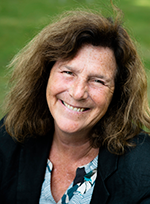
Molly Andrews
“We’ve been talking almost half my life”: Scholarship and Long Conversations in East
Germany
Molly Andrews (University of East London)
Chair: Kirsti Salmi-Nikander
Assistant moderator: Ulla Savolainen
Short abstract: This presentation will explore what it means to conduct an in-depth interview-based research project over the course of nearly three decades. My research with East German dissident activists began in 1992. Some of these conversations have continued for 28 years. I will discuss how our relationships have developed, and the ways in which this long-term perspective has impacted upon my scholarship on biography and history.
Long abstract and biography +
Long abstract
In 1992 I interviewed forty people oppositional activists in East Germany’s peaceful revolution. I
never thought then that some of those conversations would be carrying on nearly three decades later.
The relationship I have with them is an unusual one – not quite friends, but neither purely
professional. When I see them, there is a warmth and a familiarity. Many live in the same place they
did when I first met them in 1992; when I enter their homes, I know where to hang my coat. We have
known one another through different stages of life; from the heated days of their political
engagement through retirement, becoming grandparents, losing loved ones.
This project has given me the opportunity not only to engage with how project participants view their own changing biography, but also to hear their views on how the political changes of 1989 have been commemorated. Of these, the story of the fall of the wall is perhaps the best known, and most contentious, of the events of 1989. Globally, the fall of the wall has become the iconic symbol of people power; meanwhile, the stories of the dissidents of Autumn ‘89 have become increasingly written over in the public memory.
But after nearly 3 decades of knowing one another, I am struck by their quiet confidence and resilience, knowing their collective efforts brought down a powerful dictatorship, and believing that there may still be a time which is ripe for their radical message of the urgency for human dialogue.
Biography
Molly Andrews is Emerita Professor of Political Psychology at the University of East London
and the co-director of the Association of Narrative Research and Practice. In 2019-2020, she was the
Jane and Aatos Professor at the Helsinki Collegium for Advanced Studies. Her research interests
include political narratives, the psychological basis of political commitment, political identity,
patriotism, and aging. Her books include Lifetimes of Commitment: Aging, Politics, Psychology
and Shaping History: Narratives of Political Change (both Cambridge University Press), and
Narrative Imagination and Everyday Life (Oxford University Press). She serves on the
Editorial Board of five journals which are published in four countries, and her publications have
appeared in Chinese, German, Swedish, Spanish, French, Czech and Finnish.
Closing event: Baking the Rules
Introduction-response by Sarah Green
Moderated by Roger Norum
Abstract:
Eating is both a deeply symbolically dense, as well as an essential activity, and is linked to a dazzling
array of political, economic, social, environmental and religious meanings, rules and norms. For that
reason, food – raw or cooked, slow or fast, processed or unprocessed, plant- or animal-based – has long been
the focus of both academic research and political activism. Food sustains us (in life), connects us (to one
another) and emplaces us in the world and on the planet. At once essential to human existence and yet often
insufficiently or inequitably provisioned, food also differentiates us, sedimenting social groups and
defining social hierarchies. Food is also closely linked to our senses and our memories. Thinking critically
about food ethnologically broaches fundamental questions about diversity, humanity and the place of people
on the planet: foodstuffs and foodways are tools for understanding societies, cultures and the global and
environmental connections that bring them together – or set them apart. This closing roundtable session uses
eating and food as a trace for considering the dynamics of how to break the rules through collaborative
action in and outside the academy. Invited participants are asked to bring to the table one particular
culinary index: a particular foodstuff, a memorable recipe or meal, or any link to the edible or drinkable
things that nourish and nurture us as terrestrial beings. With this as a simultaneously epicurean and
epistemic point of departure, they will reflect upon its links with their own engagements with activism and
academia.
Discussants:
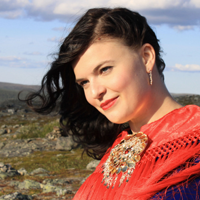 Stina Aletta Aikio - Master of Arts and Design, Stina Aletta Aikio
is a Deatnu Sámi experimental artist who combines in their artistic work new media expressions and duodji
tradition with modern materials, such as waste, metal and glass. They are interested in the tensions in
societies and questions of justice. Aikio has worked actively in the Nordic queer Sámi movement and the
positions of minorities within minorities are close to their heart.
Stina Aletta Aikio - Master of Arts and Design, Stina Aletta Aikio
is a Deatnu Sámi experimental artist who combines in their artistic work new media expressions and duodji
tradition with modern materials, such as waste, metal and glass. They are interested in the tensions in
societies and questions of justice. Aikio has worked actively in the Nordic queer Sámi movement and the
positions of minorities within minorities are close to their heart.
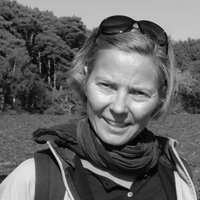 Eeva Berglund - has long explored issues around environmental politics and transformations
in notions of expertise. She has a doctorate in social anthropology and an MSc in urban planning, both from
the UK. She is currently Adjunct professor of environmental policy, Department of Design at Aalto
University, Finland. A publication worth mentioning is the 2019 volume, Dwelling in Political
Landscapes: Contemporary Anthropological Perspectives, which she co-edited with Anu Lounela and
Timo Kallinen.
Eeva Berglund - has long explored issues around environmental politics and transformations
in notions of expertise. She has a doctorate in social anthropology and an MSc in urban planning, both from
the UK. She is currently Adjunct professor of environmental policy, Department of Design at Aalto
University, Finland. A publication worth mentioning is the 2019 volume, Dwelling in Political
Landscapes: Contemporary Anthropological Perspectives, which she co-edited with Anu Lounela and
Timo Kallinen.
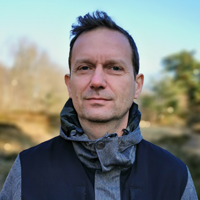 Håkan Jönsson - is associate professor in European Ethnology and senior lecturer in Food
technology and nutrition at Lund University (Sweden). His research profile is food, culture and consumption,
often conducted in interdisciplinary projects, involving both public and private actors outside academia. He
has been Involved in several applied cultural analysis projects encompassing food concept development,
retail, regional foresight and culinary tourism. Currently working on Horizon 2020 project NextFOOD- Educating the next generation of professionals in
the agrifood system. Co-chair of the European working group for Ethnological food research.
Håkan Jönsson - is associate professor in European Ethnology and senior lecturer in Food
technology and nutrition at Lund University (Sweden). His research profile is food, culture and consumption,
often conducted in interdisciplinary projects, involving both public and private actors outside academia. He
has been Involved in several applied cultural analysis projects encompassing food concept development,
retail, regional foresight and culinary tourism. Currently working on Horizon 2020 project NextFOOD- Educating the next generation of professionals in
the agrifood system. Co-chair of the European working group for Ethnological food research.
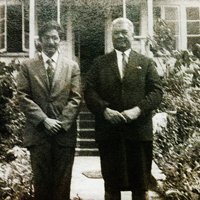 George
E. Marcus - is Distinguished Professor of Anthropology at the University of California, Irvine, and
founding Director of its Center for Ethnography. Previously, he was Chair of the Anthropology Department at
Rice University for 25 years. He was founding editor of the journal Cultural Anthropology. Primary
publications are Writing Culture (1986, co-editor), Anthropology as Cultural Critique (1986,
co-author),Lives In Trust (1992), The Late Editions series of annuals (editor, 1992-2000), Ethnography
Through Thick and Thin (1998), Ocasiao (co-author, 2005), Anthropology of the Contemporary (co-author,
2008), Fieldwork Is Not What It Used To Be (co-editor, 2009), Ethnography By Design (2019, co-author),
Collaborative Anthropology Today: a Collection of Exceptions (2020, co-editor).
George
E. Marcus - is Distinguished Professor of Anthropology at the University of California, Irvine, and
founding Director of its Center for Ethnography. Previously, he was Chair of the Anthropology Department at
Rice University for 25 years. He was founding editor of the journal Cultural Anthropology. Primary
publications are Writing Culture (1986, co-editor), Anthropology as Cultural Critique (1986,
co-author),Lives In Trust (1992), The Late Editions series of annuals (editor, 1992-2000), Ethnography
Through Thick and Thin (1998), Ocasiao (co-author, 2005), Anthropology of the Contemporary (co-author,
2008), Fieldwork Is Not What It Used To Be (co-editor, 2009), Ethnography By Design (2019, co-author),
Collaborative Anthropology Today: a Collection of Exceptions (2020, co-editor).




